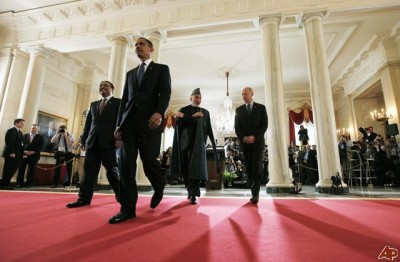ISLAMABAD, Nov 20 - As the United States ponders its Afghan strategy, Pakistan is waiting nervously, worried that a U.S. troops surge would widen the war but also keen to see a robust U.S. commitment that would convince the Taliban to talk.
U.S. President Barack Obama pledged on Wednesday to end the Afghan war before he leaves office.
He said he would announce the results of his long-awaited review soon and it would include an exit strategy to avoid “a multi-year occupation that won’t serve the interests of the United States”.
There are nearly 110,000 foreign troops in Afghanistan, including 68,000 Americans, more than half of whom have arrived since Obama took office. He is now deciding whether to fulfil his commander’s request for tens of thousands more.
That has raised worry in Pakistan of a spike of Afghan violence spilling over the ill-defined border into Pakistan where its army is battling its own version of the Taliban.
Those fears were raised recently in talks in Islamabad with visiting U.S. national security adviser General James Jones, a senior Pakistani government official said.
“We have concerns that Taliban may try to cross into Pakistan if violence increased after the new deployment,” said the official who is involved in Afghan policy.
“Such a situation will definitely complicate issues for us particularly at a time when we’re involved in the offensive in Waziristan,” he said, referring to a month-long offensive in South Waziristan on the Afghan border.
The army has seized most main Pakistani Taliban bases in the region of barren mountains and patchy scrub. The militants have retaliated with a barrage of bombs in towns and cities.
Responding to Pakistani concerns of a spill-over, U.S. officials said reinforcements would not open new fronts but would focus on securing populated areas, the official said.
While worried about the arrival of more U.S soldiers, Pakistan is probably more vexed about the possibility of their hasty departure.
Memories of the United States walking away from Afghanistan after the Soviet withdrawal in 1989 and leaving the country in chaos are still raw in Pakistan.
“They have always felt that the United States would run away and they would be left with the mess — just like they were in the 1990s,” said former CIA analyst Bruce Riedel.
“It is very hard to dispel that image,” said Riedel, who was in charge of Obama’s review of policy on Afghanistan and Pakistan last March. He is now with the Brookings Institution.
STAGGERED EXIT
Obama’s talk of an exit before he leaves office is likely to compound fears of a U.S. rush to the door. The U.S. president comes to the end of his first term in just over three years. A second and final term would end in seven years.
“An exit strategy should be staggered over six to seven years .. They shouldn’t repeat the mistake made after the Soviet withdrawal,” said the Pakistani official, who declined to be identified.
Pakistan wants to see an orderly U.S. withdrawal after a negotiated settlement including elements of the Taliban.
The Taliban will seize on any sign of U.S. vacillating as weakness and will only be dragged into talks if they are convinced of U.S. commitment backed by troops, an analyst said.
“It’s very important that they should increase their numerical strength and give an impression to the Taliban that they aren’t going away. Tilt the balance in their favour to a point at least that some decent negotiations can go on,” said retired Pakistani general and analyst Talat Masood.
But any show of force to convince the Taliban of U.S. commitment must be accompanied by political reform to win over ethnic Pashtuns, another Pakistani official said.
The Taliban draw most of their support and recruits from Afghanistan’s biggest ethnic group, many of whom feel alienated by a Kabul government seen as dominated by ethnic Tajiks even though President Hamid Karzai is Pashtun.
“Military strategy alone can’t correct policy-level errors,” said a senior Pakistani security official. “They have to help create a system of governance that has broader acceptability and legitimacy by getting the larger Pashtun population on board.”
The United States also wanted Pakistan to be a conduit for talks with the Taliban, the official said. Pakistan officially cut contacts with their former allies after the Sept. 11 attacks.
(News sourced from: Reuters)

 They also believe the fall of Kabul would provide al-Qaida once more with an expanse of territory from which to plot new attacks on the west on the scale of September 11.
They also believe the fall of Kabul would provide al-Qaida once more with an expanse of territory from which to plot new attacks on the west on the scale of September 11.





